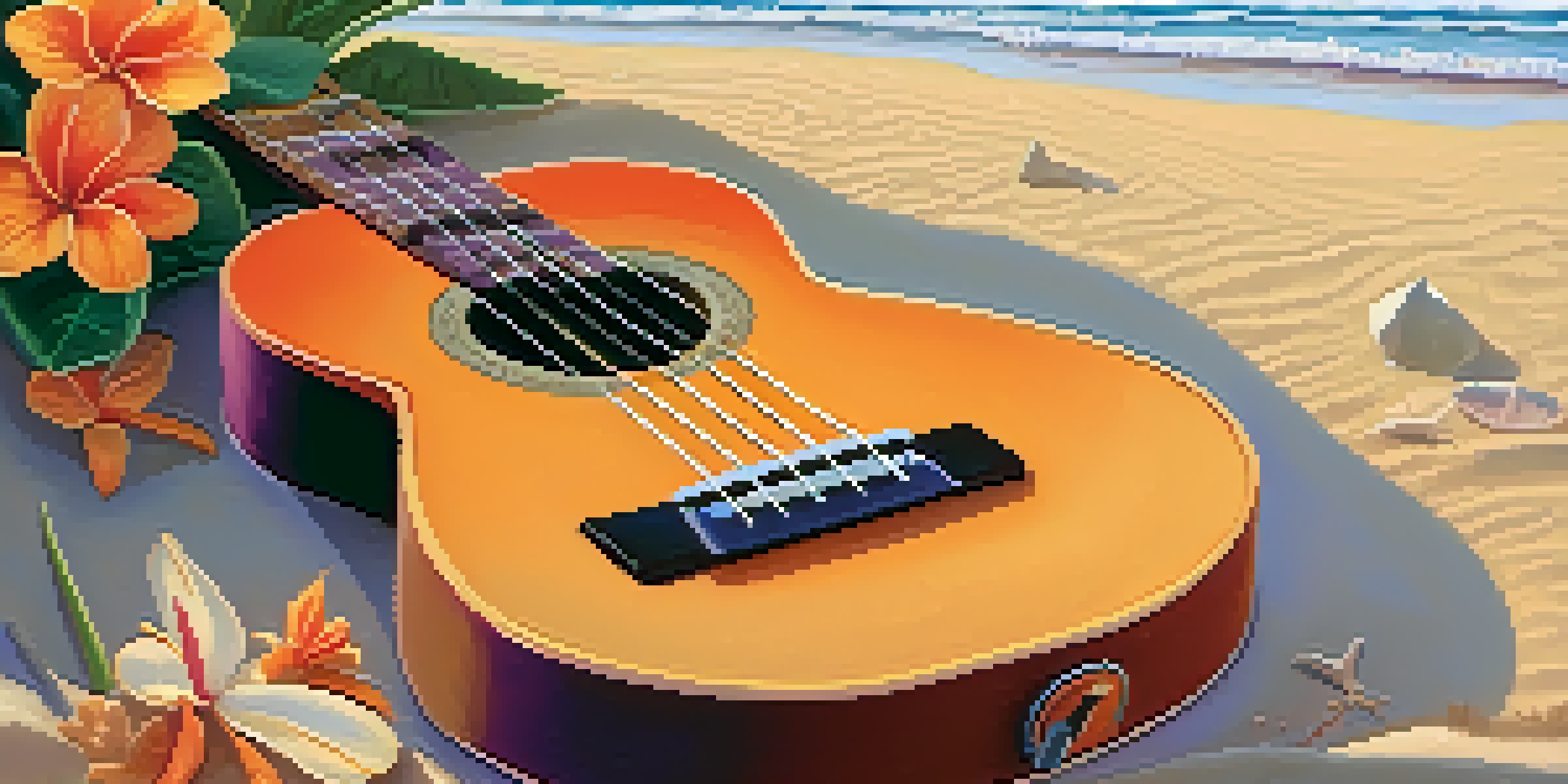The Ukulele's Role in Hawaiian Culture and Its Global Spread

The Origins of the Ukulele in Hawaii
The ukulele, often affectionately called the 'uke,' has roots that trace back to the late 19th century in Hawaii. It evolved from the Portuguese braguinha, brought to the islands by immigrants, and quickly found its place in Hawaiian culture. In a way, it was like a musical ambassador, blending different cultural influences into one harmonious sound.
The ukulele is the instrument of the people, a bridge between cultures, and a celebration of life.
As locals embraced the braguinha, they adapted it, leading to the creation of the ukulele we know today. The instrument became a staple at gatherings, celebrations, and family events, symbolizing the spirit of aloha. Its joyful melodies captured the heart and essence of Hawaiian life, making it more than just a musical tool.
The ukulele's design, with its four nylon strings, made it accessible for everyone, from children to elders. This accessibility allowed for its rapid popularity, creating a sense of community and connection among those who played it. Thus, the ukulele became a vital part of Hawaii's cultural identity.
Cultural Significance of the Ukulele in Hawaii
In Hawaiian culture, the ukulele is more than just an instrument; it represents a way of life. Its music often accompanies hula dances, telling stories and celebrating traditions passed down through generations. Each strum carries the weight of history, connecting the past with the present.

Moreover, the ukulele fosters a sense of community, with many people gathering to play and sing together. Family gatherings often feature ukulele performances, creating lasting memories and reinforcing bonds. It's as if the music weaves together the fabric of Hawaiian identity, inviting everyone to join in.
Cultural Roots of the Ukulele
The ukulele, originating from the Portuguese braguinha, evolved in Hawaii and became a symbol of local culture and community.
The ukulele also serves as a means of cultural expression, allowing musicians to convey their feelings and experiences. It embodies the spirit of aloha, promoting love, peace, and harmony. In this way, the ukulele holds a cherished place in the hearts of Hawaiians.
The Ukulele's Global Journey and Popularity
The ukulele's charm didn't stay confined to Hawaii; it began to spread across the globe in the early 20th century. Its introduction to the mainland United States coincided with the rise of jazz, and musicians quickly adopted it for its unique sound. This marked the beginning of a worldwide love affair with the instrument.
Music is the voice of the soul, and the ukulele brings out the joy in every heart.
Throughout the decades, the ukulele has appeared in various musical genres, from folk to pop, showcasing its versatility. Artists like Israel Kamakawiwoʻole popularized the instrument further with his rendition of 'Somewhere Over the Rainbow,' introducing it to a new generation of fans. Many musicians found that the ukulele could convey emotions in a way that resonated deeply with listeners.
Today, the ukulele is celebrated in music festivals and classrooms worldwide, making it a symbol of joy and creativity. Its lightweight and portable design makes it easy for anyone to pick up and play, reinforcing its role as a universal instrument. The ukulele continues to bridge cultures, bringing people together through the love of music.
Influence on Modern Hawaiian Music
Modern Hawaiian music has been significantly influenced by the ukulele, evolving while maintaining its traditional roots. Contemporary artists blend reggae, folk, and pop, showcasing the instrument's versatility. This fusion creates a unique sound that resonates with both locals and tourists alike.
Ukulele festivals in Hawaii highlight both traditional and modern styles, attracting musicians and enthusiasts from around the world. These events celebrate the instrument's cultural heritage while encouraging new interpretations. It's a beautiful reminder that the ukulele continues to adapt and evolve, just like the culture it represents.
Global Popularity and Influence
From its Hawaiian roots, the ukulele has gained worldwide popularity, influencing various music genres and connecting diverse cultures.
Moreover, the ukulele is often used as a tool for teaching Hawaiian language and culture. Its presence in educational settings helps foster a deeper understanding of Hawaiian traditions, connecting the younger generation to their roots. This educational aspect further solidifies the ukulele's importance in modern Hawaiian society.
The Ukulele as a Tool for Education
The ukulele has found its way into classrooms worldwide, proving to be an effective educational tool. Its simplicity makes it an ideal instrument for beginner musicians, allowing students to learn music theory and practice rhythm. In this way, the ukulele serves as a gateway to a broader understanding of music.
Teachers often use the ukulele to engage students, making learning fun and interactive. With its cheerful sound, the instrument can create a positive atmosphere in the classroom, encouraging participation and creativity. This has led to an increase in ukulele programs in schools, helping to foster a love for music among young learners.
Beyond music education, the ukulele also promotes cultural awareness. As students learn to play traditional Hawaiian songs, they gain insight into the values and history of Hawaiian culture. This cross-cultural exchange enriches their education, making the ukulele a valuable asset in promoting global understanding.
The Ukulele in Popular Culture
The ukulele has made significant appearances in popular culture, solidifying its place in the hearts of many. From movies to television shows, this charming instrument often represents carefree fun and a laid-back lifestyle. Its presence adds a whimsical touch, making scenes more memorable.
Artists across genres have featured the ukulele in their music, showcasing its versatility. Whether in a pop song or an indie folk track, the sound of the ukulele creates an inviting atmosphere that resonates with listeners. This widespread use has further cemented its status as a beloved instrument.
Educational Value of the Ukulele
The ukulele serves as an effective educational tool, fostering music appreciation and cultural awareness among students globally.
Additionally, social media platforms have played a pivotal role in the ukulele's resurgence. Viral videos of talented players have inspired countless individuals to pick up the instrument, fostering a global community of ukulele enthusiasts. This newfound popularity continues to inspire creativity and joy among musicians and fans alike.
Conclusion: The Enduring Legacy of the Ukulele
The ukulele's journey from Hawaii to the global stage is a testament to its enduring appeal. It has transcended cultural boundaries, bringing people together through the universal language of music. This small yet powerful instrument has created connections that span generations and continents.
As we look to the future, the ukulele will undoubtedly continue to evolve, embracing new styles while honoring its rich heritage. Its role in education, popular culture, and modern music ensures that it remains relevant and cherished. The ukulele is a symbol of joy, creativity, and cultural exchange.

Ultimately, the ukulele reminds us of the power of music to unite and inspire. Whether strumming on a beach in Hawaii or in a classroom halfway across the world, the ukulele continues to spread its message of aloha, making it a beloved instrument for all.